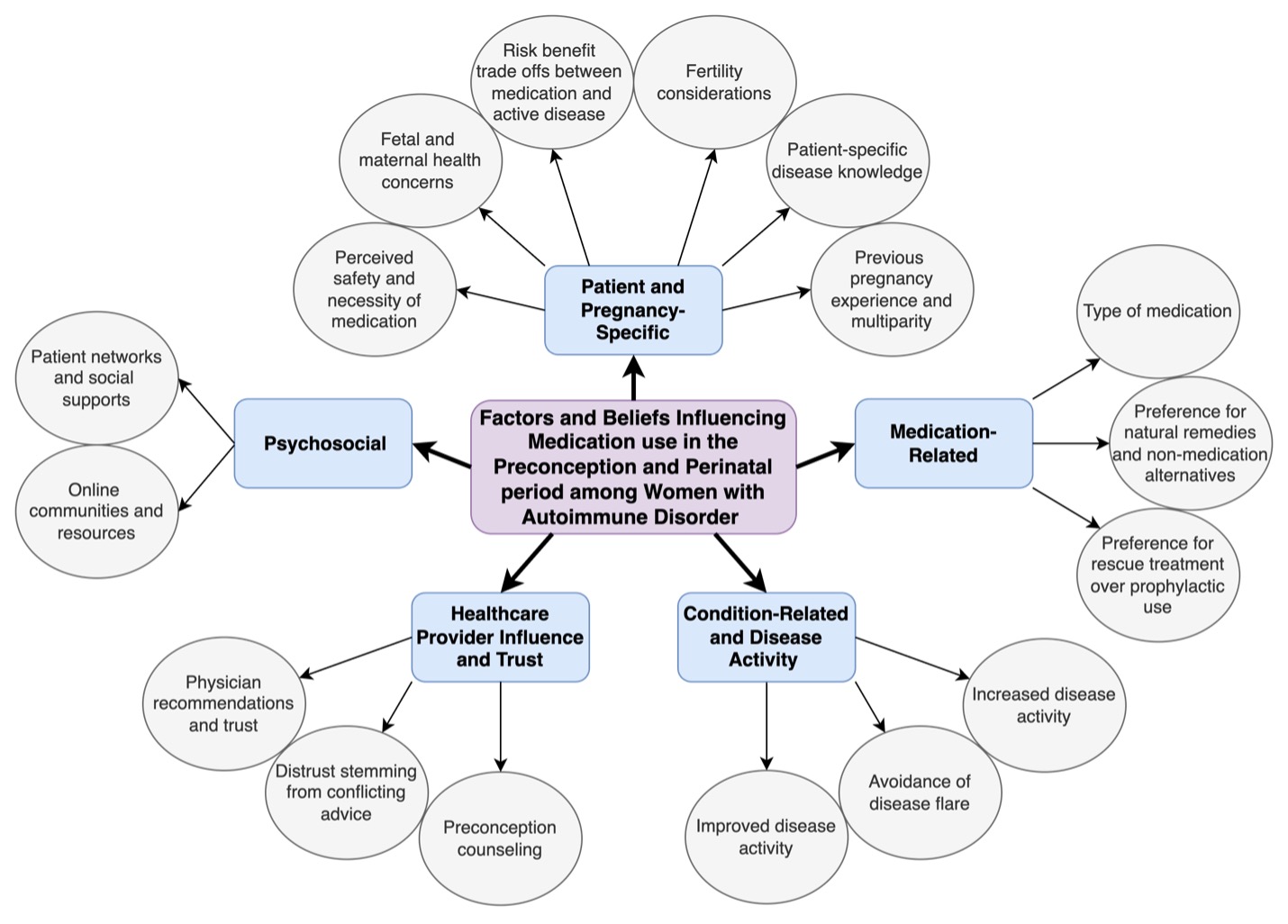Session Information
Date: Tuesday, October 28, 2025
Title: (2547–2566) ARP Posters I
Session Type: Poster Session C
Session Time: 10:30AM-12:30PM
Background/Purpose: Autoimmune disorders (AD) disproportionately affect women of reproductive age, presenting challenges for disease management during the preconception and perinatal periods. Treatment decisions are complicated by the need to balance disease activity with potential risks to maternal and fetal health. Concerns about medication safety, teratogenicity, and disease severity often influence whether treatments are continued, discontinued, or switched. The objective of this review is to identify factors influencing medication use among women with AD who are attempting to conceive or are pregnant.
Methods: We conducted a systematic search in Ovid MEDLINE, Embase, CINAHL, and Cochrane Central for studies published from database inception until July 2024. Studies were included if they examined women with AD (e.g., inflammatory bowel disease (IBD), rheumatoid arthritis (RA), systemic lupus erythematosus (SLE), multiple sclerosis (MS), vasculitis) in the preconception or perinatal periods, reported on medication use or decision-making, and were published in English. Both qualitative and quantitative studies were eligible for inclusion. Data on medication use were extracted and categorized using the WHO Multidimensional Adherence Model. Themes were synthesized using a narrative approach. Study quality was assessed using JBI (formerly Joanna Briggs Institute) critical appraisal tools.
Results: Our search identified 6415 articles, of which 20 studies met the inclusion criteria. Factors influencing medication use included patient- and pregnancy-specific beliefs (e.g., safety concerns, perceived necessity, and disease knowledge), medication-related (type and preference), condition-related (disease severity and activity), healthcare provider influence and trust, and psychosocial factors such as social support and involvement in online communities. Factors contributing to the continuation of medications included trust in healthcare providers and knowledge surrounding disease management, while discontinuation was found to be influenced by concerns about fetal harm and distrust in medical advice. Notably, inconsistent messaging from providers emerged as a recurrent barrier to medication use.
Conclusion: Decisions surrounding medication use in women with AD during the preconception and perinatal periods are shaped by complex, multifactorial influences. Addressing gaps in provider consensus, improving patient education, and increasing patient supports could improve informed decision-making and management of disease. Future research should focus on including underrepresented AD subtypes beyond IBD and RA to better understand the experiences of women with these conditions.
 Factors and beliefs influencing medication use in the preconception and perinatal period among women with autoimmune disorders
Factors and beliefs influencing medication use in the preconception and perinatal period among women with autoimmune disorders
To cite this abstract in AMA style:
Novosel O, Chiodo S, Marks Y, Li L, Fajardo R, Tailor L, Zhao L, Cunningham J, Longo C, Grandi S. Factors Associated With Medication Use in the Preconception and Perinatal Period Among Women With Autoimmune Disorders: A Systematic Review [abstract]. Arthritis Rheumatol. 2025; 77 (suppl 9). https://acrabstracts.org/abstract/factors-associated-with-medication-use-in-the-preconception-and-perinatal-period-among-women-with-autoimmune-disorders-a-systematic-review/. Accessed .« Back to ACR Convergence 2025
ACR Meeting Abstracts - https://acrabstracts.org/abstract/factors-associated-with-medication-use-in-the-preconception-and-perinatal-period-among-women-with-autoimmune-disorders-a-systematic-review/
